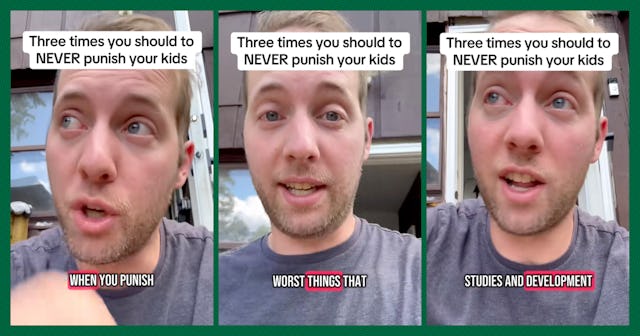This Dad Says Not To Punish Your Child For Misbehaving Toward A Sibling — Here’s Why
Sometimes, punishments feel like our only parenting option, but TikTok creator @wholeparent cautions against rushing to consequences.

Pretty much every parent I’ve met (myself included) likes to avoid punishing their kids whenever possible. It doesn’t feel good. That said, I don’t think I’ve ever met a parent who’s never punished their kids at all. It’s the ideal, sure, but it’s hard to actually pull off. (We are, despite what our children believe, human.) TikTok creator and author of Punishment Free Parenting Jon Fogel (@wholeparent) is, unsurprisingly, anti-punishment as a general rule, but recently posted a video highlighting moments when punishment is really not the vibe.
“All three are anti-helpful for the goals most parents have for their kids,” he explains.
The first two are, perhaps, fairly common knowledge, but bear reminding: don’t punish them when they come to you for help, even when they mess up or break a rule, and don’t punish them in an effort to instill self-motivation.
“When you punish your kid [for coming to you with a problem], you are teaching them that they should not come to you for help,” Fogel explains of the former. “And those are the kids who wind up at 16 at a party intoxicated and they don’t want to call you for help and so they make a decision that can change their life forever.”
As for punishing them for, say, not doing chores, that generally serves to associate punishment with the task.
“Because you’ve made it about you,” Fogel notes. “And when you’re not there to enforce anymore they’re just not going to want to do it.”
The third, however, is one we hadn’t heard before: Do not punish your kids when they do something bad to their sibling.
“I know. It seems totally counterintuitive,” Fogel admits. “But what we know is when you punish your kid for something they did to their sibling, they actually don’t blame you or themselves for the punishment: they blame their sibling. Most parents want their kids to grow up to be friends, to have a good relationship, and when you punish your kids for things that happen between the siblings you make that much harder.”
So what do you do? It depends on the situation, the siblings, and you. Sometimes it’s going to be useful to separate the kids until they can calm down enough to handle one another’s presence and perspective. Other times, you might want to mediate their disagreement, encouraging them to have empathy for the other’s perspective. But most experts seem to agree that you should stay out of it all together if you can and let them handle their own arguments. You can help preemptively (and without them even knowing it) by modeling conflict resolution with your partner, friends, and maybe even your own siblings. Praise those positive behaviors when you see them putting them into practice.
No one is born knowing these things, and no parent comes to the table knowing how to teach them, either. But being mindful is the first step. So next time you find yourself in any of these three situations, take a beat, take a breath, and move forward with grace, empathy, and understanding as much as you can.